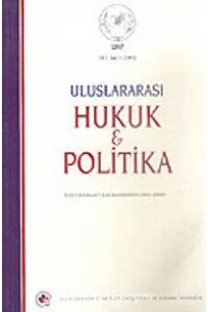Application of transitional justice mechanisms: post assimilation campaign against the turkish minority in bulgaria
Bulgaristan’ daki Türk azınlığına yönelik asimiilasyon kampanyası sonrası özelinde geçiş dönemi adaleti mekanizmalarının uygulaması
___
- Angelov, Guillermo, “Party, Opposition Begins Talks in Bulgaria”, United Press International, January 3, 1990, http://www.lexisnexis.com/universe.
- Eminov, Ali, Turkish and Other Muslim Minorities in Bulgaria, (London: Hurst & Company, 1997).
- Eminov, Ali, “The Turks in Bulgaria: Post-1989 Developments”, Nationalities Papers, Vol. 27, No. 1, 1999, pp. 31-55.
- Hamber, Brandon and Steve Kibble, “From Truth to Transformation: South Africa’s Truth and Reconciliation Commission”, http://www.csvr.org.za/papers/papbhsk. htm#note4.
- Handley, John W, “Bulgarian Political Development,” 2003, http://www.unc.edu/depts/ diplomat/archives_roll/2003_07-09/handley_bulgaria/handley_bulgaria.html.
- Hayner, Priscilla B., Unspeakable Truths: Facing the Challenge of Truth Commissions, (New York and London: Routledge, 2002).
- Human Rights Watch Report, “Bulgaria: Human Rights Developments”, 1992, http:// www.hrw.org/reports/1992/WR92/HSW-02.htm#P151_41806.
- Ganev, Venelin I., “Bulgaria’s Symphony of Hope”, Democracy, Vol. 8, No. 4, 1997, pp. 125-139.
- Keen, Sam, Faces of the Enemy: Reflections of the Hostile Imagination, (San Francisco: Harper & Row, 1986).
- Laber, Jeri, “Destroying Ethnic Identity: The Turks of Bulgaria”, Helsinki Watch Report, 1987.
- Mahon, Milena, “The Turkish Minority under Communist Bulgaria-Politics of Ethnicity and Power”, Journal of Southern Europe & the Balkans, Vol. 1, No. 2, 1999, pp. 149-162.
- Minow, Martha, Between Vengeance and Forgiveness: Facing History after Genocide and Mass Violence, (Boston: Beacon Press, 1998).
- Nacheva, Velina, Notes from History-Restoring Tolerance, 2004, http://www.sofiaecho. com/article/notes-from-history---restoring-tolerance/id_9704/catid_32.
- Petkova, Lilia, “The Ethnic Turks in Bulgaria: Social Integration and Impact on Bulgarian Turkish Relations, 1947-2000”, The Global Review of Ethnopolitics, Vol. 1, No. 4, 2002, pp. 42-59.
- Poulton, Hugh, The Balkans: Minorities and States in Conflict, (London: Minority Rights Publications, 1993).
- Rigby, Andrew, Justice and Reconciliation: After the Violence, (Boulder & London: Lynne Rienner Publeshers, 2001).
- Shriver, Donald W., Honest Patriots: Loving a Country Enough to Remember Its Misdeeds, (New York: Oxford University Press, 2005).
- Tanev, T., 1989 Coup D’Etat and 1989 Roundtable Talks in Bulgaria, 2005, http:// home.aubg.bg/students/TTN050/304Events1989-90.doc.
- Tavuchis, Nicholas, Mea Culpa: A Sociology of Apology and Reconciliation, (Stanford: Stanford University Press, 1991).
- Vassilev, Rossen, “Bulgaria’s Ethnic Problems”, East European Quarterly, Vol. 36, No. 1, 2002, pp. 103-125.
- Zang, Theodore, News from Bulgaria: Deep Tensions Continue in Turkish Provinces, Despite Some Human Rights Improvements, (New York: Helsinki Watch, 1999).
- Zhelyazkova, Antonina, “The Bulgarian Ethnic Model”, East European Constitutional Review, Vol. 10, No. 4, 2005, http://www.law.nyu.edu/eecr/vol10num4/focus/zhe- lyazkova.html.
- Zhelyazkova, “Bulgarian Vice-President Publicly Apologizes to Turkish Minority”, ONASA News Agency, March 17, 2002, http://www.lexisnexis.com/universe.
- Zhelyazkova, “Late Apology from Bulgaria”, Turkish Daily News, March 17, 2002, http://www. lexisnexis.com/universe.
- ISSN: 1305-5208
- Yayın Aralığı: 5
- Başlangıç: 2018
- Yayıncı: Uluslararası Stratejik Araştırmalar Kurumu
Abd’ nin Irak İşgaline Uluslararası Hukuk Açısından Eleştirel Bir Bakış
Nükleer krizde Ab’nin İran politikaları: Tarihsel ve güncel bir perspektif
Çin’ in Güney Doğu Asya’ da bölgesel işbirliğine açık hegemonya girişiminin temelleri
On the Muslim Question Anne norton, princeto Universty press, 2013, 282 pages
Türkiye’ nin Pakistan politikası : İkili ilişkilerdeki temel dinamikler
The Future of Power Josaph S. Jr. Nye, Public Affairs, New York, Usa, 2011, 320 Pages.
